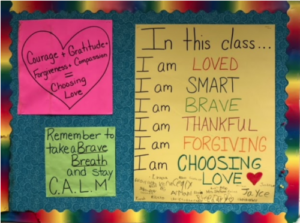10 Years of Forgiveness Education in Northern Ireland
 The Forgiveness Education Programme is celebrating its 10-Year Anniversary of working with children, schools and communities in Northern Ireland to make the virtue of forgiveness more understandable and accessible.
The Forgiveness Education Programme is celebrating its 10-Year Anniversary of working with children, schools and communities in Northern Ireland to make the virtue of forgiveness more understandable and accessible.
“Forgiveness is an important aspect in the emotional and moral development of any individual,” states Gary Trainor, Vice Principal at Mercy Primary School, “and if we can sow those seeds at an early age, we are increasing the chances of them bearing fruit throughout their lives.” It was with this long term goal in mind that the Forgiveness Education Programme first began to take shape..
In 2002, Dr. Robert Enright, Educational Psychologist at the University of Wisconsin – Madison, USA began to establish relationships with a couple of principals and schools in North Belfast. With the help of Anne Gallagher of Seeds of Hope, Dr. Enright was able to introduce Forgiveness Education to the first classroom of Primary 3 pupils in Ligoniel Primary School.
Ten years on, Claire Hillman, Principal at Ligoniel PS says, “At the time we started we had very few personal development resources in the primary school and no coherent programme of work. The Forgiveness (Education) Programme helped us to formulate a whole school approach to building personal qualities such as empathy, respect and trust. The programme now sits alongside the PDMU (Personal Development for Mutual Understanding) programme of work developed by the curriculum council. The work of Professor Enright has helped us develop the life skills of hundreds of children in North Belfast and is continuing to impact on their lives.”
This same perspective is echoed by Mr. Trainor from Mercy PS who says, “During our daily interactions with our pupils, as teachers we are always promoting the positive attributes and virtues we wish those in our care to portray. The Forgiveness (Education) Programme consolidated our aspirations for kindness, generosity, sharing and understanding. It gave us an extra tool to enhance our pupils’ experiences through story, discussion, art and role play. The children’s ability to communicate their feelings also improved, they began to develop a vocabulary that was both respectful of others and of themselves.” Mercy Primary School first began teaching Forgiveness Education in 2005.
Over the years, the Forgiveness Education Programme has developed and grown from that first Primary 3 classroom. Overseen locally by Padraig O’Tuama and then Becki Fulmer, in cooperation with Youth with a Mission, Peacelines, and now The Corrymeela Community since 2009, the programme has grown throughout the years from one classroom in one school to the curriculum being taught in over 100 classrooms in 20 schools across Northern Ireland.
One school in particular who has been involved with Forgiveness Education since 2004 is Holy Family Primary School. Dinah McManus, Principal, always refers to Holy Family as a “Forgiving School” because they have imbedded the virtue of forgiveness in to their school ethos. Mrs. McManus states, “I can say with confidence and some pride that in creating a “forgiveness ethos” in Holy Family we have provided our children with a very nurturing environment which reflects the essential elements of our Mission Statement: We are a living Faith community, centred on the Gospel values of love, justice and forgiveness, within which each member of our school community is valued and respected.”
Mrs. McManus states, “I can say with confidence and some pride that in creating a “forgiveness ethos” in Holy Family we have provided our children with a very nurturing environment which reflects the essential elements of our Mission Statement: We are a living Faith community, centred on the Gospel values of love, justice and forgiveness, within which each member of our school community is valued and respected.”
She goes on to say, “As the Forgiveness Education Programme has developed in Holy Family we, as teachers, have explored the messages within the programme and have come to appreciate their value to us in our efforts to create a strong, cohesive team. We acknowledge that we are all human and, as such, flawed. We now take time, for example on our ethos day, to remind ourselves of the power of forgiveness. To forgive another does not mean to forget what happened or to negate the other person’s responsibility for their actions. It simply means that we no longer allow another’s actions or words to cause us anger or resentment. By understanding the other person’s humanity, by forgiving without expecting anything in return, we are the ones who are healed. There is no doubt that we are, as a result, much more understanding of each other’s foibles and less inclined to find fault or to take offence at others’ comments or actions.”
The Forgiveness Education Programme has spent the past ten years dedicated to helping children, schools and communities develop a better understanding of what it means to value all people, to understand our own and others humanity and to practice respect, kindness, generosity and forgiveness. We look forward to what the next ten years have to offer.
If you are in the Republic of Ireland or anywhere else in the world and would like to bring Forgiveness Education to your school, please contact the Director of our International Forgiveness Institute at director@internationalforgiveness.com.
Becki Fulmer, Director
Northern Ireland Forgiveness Education Program




I so wish that I had this when a lad. It would have helped me curb some anger.
This would help the students be better husbands and wives when they are adults. We all need this!
I am presuming that this programme is developmental in nature, starting with the simple themes and progressing toward the more subtle. Having read Dr. Enright’s book, The Forgiving Life, a great read by the way, I have come to appreciate the idea of the school and the family as forgiving communities. It takes a lot of backbone for parents and school administrators to finally say yes to a programme like this, which is unique and should not now be unique. So many could benefit by seeing their home and school as places where forgiveness is learned and fostered.
I wonder, though. Surely you need to balance forgiveness and mercy with a strong sense of justice in children. You do not want them to grow up thinking that mercy is the one dominant value across the planet. That would be dangerous. How can you work this so that the children do not lose their sense that fairness and justice are so really important in their lives and in the community?
Hello everyone, I just wanted to take the opportunity to respond to the questions raised by Denise and Chris. Yes, the Forgiveness Education Curriculum Guides are designed to teach children about forgiveness from a developmental perspective. We start by teaching very young children about what love, kindness and generosity looks like in a family, with friends and in a community. We then build upon that by teaching older children that all people are valuable and have inherent worth, including themselves. We also talk about feelings and emotions. Once these foundational concepts are understood, the children are able to learn about, understand and dialogue about the more nuanced aspects of forgiveness such as how to be wise forgivers, how to keep oneself safe when forgiving, and understanding the differences between forgiveness and reconciliation. I hope this helps to address both of your queries. All the best…
Thank you, Ms. Fulmer for your explanation. It makes sense, especially about the part that when people forgive they can and should be protected.